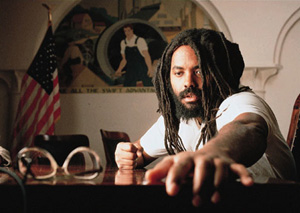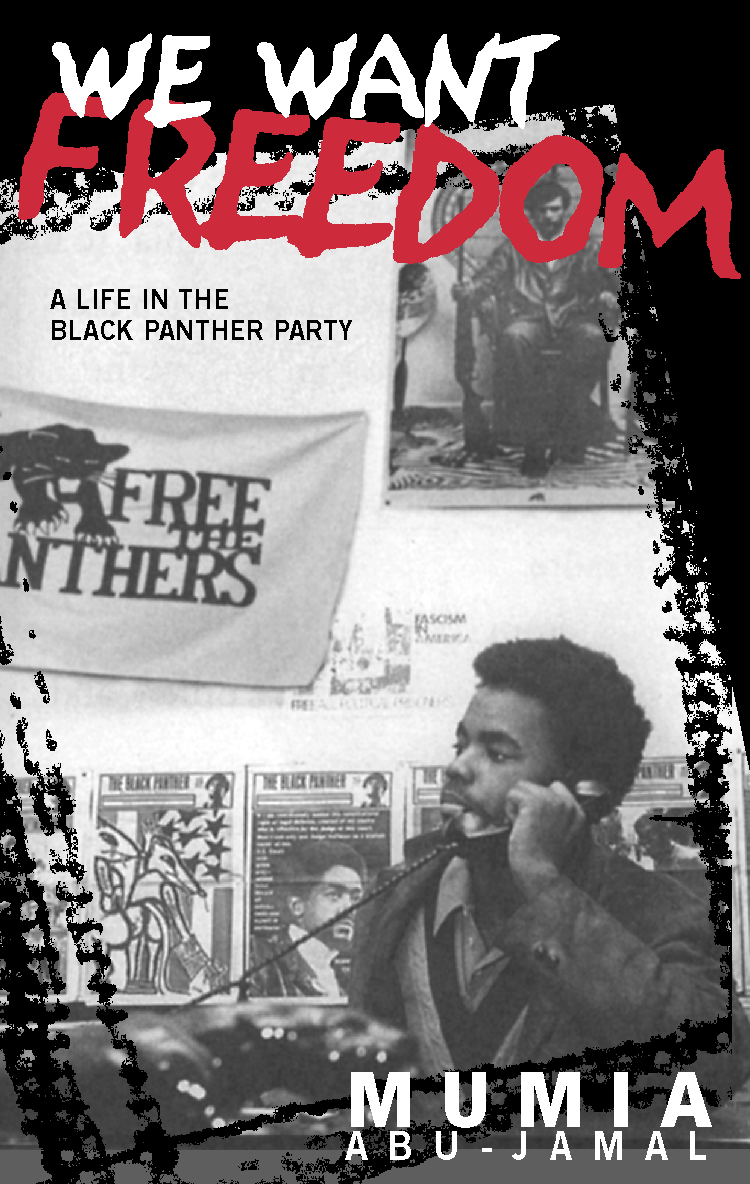READY TO PARTY: MUMIA ABU-JAMAL AND THE BLACK PANTHER PARTY |
|
| by Todd Steven Burroughs, Ph.D. special to Prof. Kim's News Notes |
|

NOTE: In his new book, "We Want Freedom: A Life In The Black Panther Party" (South End Press), Mumia Abu-Jamal, a Pennsylvania Death Row inmate, remembers his Party days. In this excerpt of "We Want Freedom," he recalls how he and other Black Philadelphia residents formed the city’s BPP branch. He mentions The Black Panther, which was the Party’s national newspaper. He also mentions the FBI’s Counter-Intelligence Program (COINTEL-PRO), designed to eradicate militant dissent from the United States. The Black Panther Party quickly became a priority to the FBI, since the Party combined the two things the bureau feared most: Leftist political activity and Black insurrection. – Todd Steven Burroughs FOUNDING THE PHILADELPHIA BPP (PART I)By Mumia Abu-Jamal It’s difficult to pinpoint the exact moment the Black Panther Party was formed in Philadelphia. That’s because, in fact, there were several such formations: one in South Philadelphia, one in Germantown, and one in North Philadelphia. The North and South Philadelphia formations would merge, and the Germantown group, a mysterious gathering that apparently only sold papers, would wither. As in any such political organization, there was intense jockeying for power, divided between younger and older and between north and south sections of the city. They met each other, quietly, in a Center City bookstore, where The Black Panther and various books were sold. Some days later they met in a tiny ghetto apartment in South Philly, at 14th and Kater Streets, right over a bar. The men were to argue and debate who would lead and who would follow. An aggressive, tall, fast-talking young man named Bill Crawford seemed to have the edge, with his fiery tongue and dark shades covering his strange, amber-colored eyes. His only real adversary was an older, slow-talking, darker-hued man, Terry McCarter, whose clever, Southern-cadenced manner had appeal. It was decided that a phone call would be made to Black Panther National Headquarters to solve the dispute, but the answer related to us was that Oakland would choose no one. According to one caller, either [BPP national leaders] David or June Hilliard, the BPP Chief of Staff or his assistant, respectively, when asked about formally recognizing the Philadelphia branch, reportedly replied: "You don’t hafta be a Black Panther to make revolution." His statement, while objectively true, did not discourage those of us who were determined to join the organization that seemed closest to its their dreams. The meetings continued, as we pondered the underlying reasons for National’s seemingly indifference. Did they get calls like that all the time? Were they being cautious of folks they didn’t know? Were they seriously trying to limit expansion? Was this a test, to see if we were serious about opening a branch? These questions were never sufficiently answered. Or perhaps they were answered by our actions, as we stubbornly resolved to just do the work. Officers were chosen, and daily tasks were assigned. When the oldhead, Terry, was chosen for captain instead of the young buck, Bill, the loser raged out of the apartment, vowing to catch the next thing smoking to Oakland to resolve this problem. Bill clearly felt he was the superior candidate and hinted that Oakland would change our choice. In fact, we never heard back from him. II I WAS CHOSEN Lieutenant of Information, a heady role for a manchild who had barely reached his 15th summer, and assigned to develop propaganda for the Party—even though no office had yet been opened. Leaflets were prepared, drawing largely from the BPP newspaper for style and tone, announcing the existence of a local branch. How does one provide contact data on a leaflet in the absence of an office? Not to worry. I simply attached the number of my home to the bottom of the leaflet, which would not have been remarkable were it not for the fact that "home" was where I lived with my mother. This led to some interesting, if somewhat passionate, exchanges between us. It also led to some equally remarkable telephone traffic to the city’s first official listing for the emergent Black Panther Party: CALLER: Yello—is zis uh, Moo-my-uh, of the Black Gorilla Party? ANSWERER: This is Mumia of the Black Panther Party—who the hell is this? CALLER: Yeah—This is Roy Frankhouser of the United Klan of America, headquartered up ‘ere in Reading, P-A. We’re havin’ a burn-a-nigger festival this weekend, and we wanna invite cha to come. You interested? ANSWERER: I doubt I’ll be able to make it, but you can bring yho ass down to Philly—we got somethin’ real nice for ya. CALLER: Well, uh—can I ask ya a question there, Moomyah? ANSWERER: What’s that? CALLER: Do niggers eat s**t? ANSWERER: Do you? CALLER: Nah, uh—really! I’m curious! Isn’t that where your brown color comes from? ANSWERER: I can’t believe you that silly, man. Ain’t you got nothin’ better to do? CALLER: Well, we got the kill-a-nigger festival I toldja about….. ANSWERER: Man, I can’t believe a grown man your age ain’t got nothin’ betta to do than play ona damn phone! Are you retarded, man? CALLER: Naw, I’m curious. [The phone is hung up.] The call probably wasn’t formally reported to my captain although I’m fairly certain that we discussed it, more like—"Man, you ain’t gonna believe the nutty ***t that I’m getting on my phone…." What is memorable, however, is the distinct accent of the caller. His high-in-the-throat, almost nasal pronunciation sounded more at home in the ethnic enclaves of South of Northeast Philadelphia (pronounced "Fluffia" by them) than distant, rural Reading. Was it really the Klan, and, if so, were they really so stupid, so childish, that a teenager could so quickly dismiss them as juvenile? It may have been, but to the youth on the receiving end of the call, he sounded like a typical Philadelphia cop. III MEANWHILE, BECAUSE OF his low-key, laid back approach, Terry was incurring more criticism than acceptance in his role of captain. It did not help matters that he seemed more drunk than sober these days. Inevitably, another power struggle developed, and Captain Terry was quietly retired in favor of a younger, more aggressive (and sober!) North Philadelphian—Reggie Schell. Captain Reg would corral the necessary resources to open the first office of the Black Panther Party in Philadelphia in late spring 1969. The site he selected at 1928 West Columbia Avenue was in the very heart of North Philly, the site of a police-sparked revolt (the city’s press would say "riot") several months before. The office would become a magnet, attracting radical and revolutionary Black youth (and others) from all corners of the city. The New York chapter, which had regional jurisdiction over the East Coast, sent its Deputy Field Marshal, Henry Mitchell, to check out the branch. With acerbic, earthy speech and arrogant, proud authority, New York gave Philadelphia its intense scrutiny. Mitchell, his face seemingly etched in a permanent scowl, was barking like a drill instructor as he issued orders to the novice troops and the newly minted captain. But by the day’s end, the city was given a passing mark. We were told to strengthen and fortify office and housing, ordered to report regularly, and abruptly left alone. After months of organizing, personnel changes, paper sales, and a grim inspection, we had succeeded. Philadelphia had its first official branch of the Black Panther Party, the first in the state. Copyright © 2004 by Mumia Abu-Jamal. Excerpted from "We Want Freedom: A Life In The Black Panther Party," published by South End Press. Reprinted with permission from South End Press. |
Table of Contents
|
|
|
|
|
| photo of Mumia Abu Jamal | |
| photo of Todd
Steven Burroughs
from Research Channel |
|
